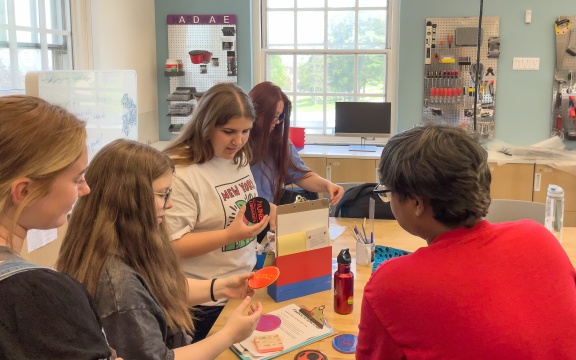The second node in UNB's makerspace ecosystem (see UNB Makerspace), the Fabrication Lab (Room 310) at the Harriet Irving Library Research Commons provides tools and fosters community for engaging in hands-on learning and making activities. Whether incorporating material representations into a class project, developing a prototype for a business, printing promotional materials for an event, or sewing a patch onto your favourite jean jacket, ours is an inclusive, versatile space open to people of all skill levels. There is always staff available to provide guidance during open hours.
Technologies
- 3D Printing
- Cricut
- Textiles
- Electronics
Equipment
- 3D printers: 7 Prusa I3 MK3S, 1 Prusa MK4, 2 Prusa MK4S
- Polymaker Polysher (PVB filament)
- Cricut Maker, Cricut Mug Press, Cricut Textile Press, and Cricut Hat Press
- Sublimation Printer
- Button Maker
- Soldering Iron
- Arduino Unos and Arduino Nanos, along with various input/output devices, resistors, power supplies, etc.
- 3 Brother CS6000i Sewing Machines
- Ryobi Cordless Dremel
- Dewalt Cordless Drill
Onsite software
- Cricut Premium (for curating and finding Cricut designs)
- Fusion 360 (for 3D model design)
- Sketchfab Premium (for hosting and embedding 3D models)
- Polycam 3D imaging software (on iPad)
Community Tools
- Tool Kit (socket wrench and sockets, screwdrivers, wrenches)
- Rechargable Drill
- Anvil Vise
- Bubble Level
- Calipers
- Sand Paper
- Craft Cutter
- Rulers/Guides
- Dremel
- Staple Gun
- Hacksaws
- Screwdrivers
- Clamps
- Hammer
- Utility Knives
- Allen / Hex Keys
- Wire Strippers
- Pliers
Crafting
- Jewelry making supplies
- Acrylic paints
- Card stock

Hours of Operation
The Fabrication Lab is open Summer 2025 Monday through Friday, 12:30 - 4:30 pm.
During these hours, staff can help you learn to use the technologies and assist with projects.
Fabrication Lab Policies
Please familiarize yourself with our policies and expectations.
3D Printing Policies:
- One Printer per User: Each user is allowed to use only one 3D printer at a time.
- Print Time Limit: Maximum print time is 24 hours per project
- Team Projects: Teams with multiple members may use a maximum of two printers at a time.
- ID: A valid digital or physical UNB Student/Staff ID is required to access the Fabrication Lab equipment/materials. External members can provide a government ID.
- Usage Frequency: 3D printer usage is limited to three days per week per user.
- Filament Colour Policy: Filament colours are subject to availability. New spools will only be opened if the same colour is not already in use and only when deemed necessary by staff.
Cricut Policies:
- Material Limit: A maximum of five materials per project is provided by the Fab Lab.
These include: mugs, t-shirts, sticker sheets, cardstock, everyday iron-on, and other Cricut-compatible materials. - Large Projects: For projects requiring more than five items, patrons must bring their own materials. Please check with our staff about what materials would be ideal to purchase for our equipment, and local locations that have these items available.
Locker Rentals:
Fabrication Lab Lockers are available for rent in the FabLab. Complete a HILRC Locker Rental Form to get started. You will be contacted within 72hrs regarding fee payment and key retrieval. Each locker requires a $15 annual fee. For questions about Locker rentals please ask our FabLab staff or contact researchcommons@unb.ca
FabLab Pricing
| ITEM | PRICE |
|---|---|
| Buttons | $0.20 (first 3 free!) |
| Mugs | $7.00 |
| T-shirt | $8.00 |
| Cricut Material (1x12) | $0.40 |
| Heat Transfer Paper (8.5x11) | $2.50 per sheet |
| Filament/3D printing | FREE |
| Custom 3D Printed Coasters | $5.00 |
| Inkjet and Sublimation Printing | $0.50 |
| Sublimation Paper/Printing | $1.00 per sheet |
| Sticker Paper/Printing | $1.25 per sheet |
| PVB 3D Printing | $40.00 (per kg) |
| ITEM | PRICE |
|---|---|
| 3D Printing | $35.00 per kg* |
| Other items | Internal member pricing + $1.00 per item |
*minimum $2.00 purchase
Maker Pedagogy
Maker or constructionist pedagogy seeks to express learning in tangible, problem-solving oriented ways. Beyond the technical skills acquired, practices involve developing skills in collaboration, project management, design thinking, and communication. Less tangible but no less important is the confidence gained in working with others and in learning and applying new technologies. If you are a student or instructor interested in the application of maker pedagogy to your courses and/or assignments, please reach out to Marc Bragdon to discuss: mbragdon@unb.ca.
Spaces + Technologies
- Active Learning Spaces
- Audio Studio
- Data Visualization Lab
- Event Space
- Fabrication Lab
- FilmMaker Studio
- Graduate Student Spaces
- Innovation Hub
- Lightboard Studio
Team + Expertise
Connect with various members of the Research Commons team.
Digital Pedagogy
Project support that leverages spaces, tech, and know-how
Events
Details on the latest offerings in the Research Commons, with links to past sessions.
Join the Conversation: Instagram